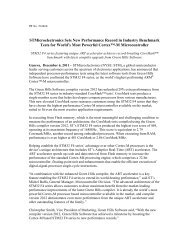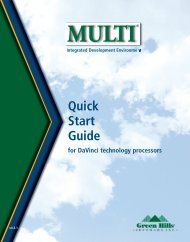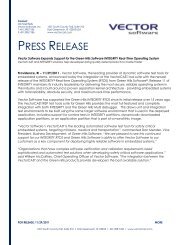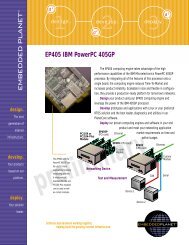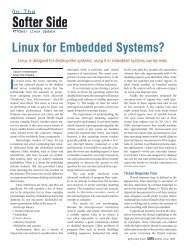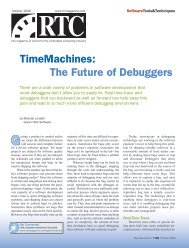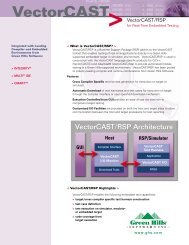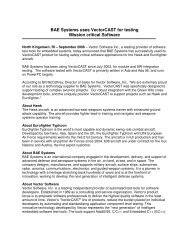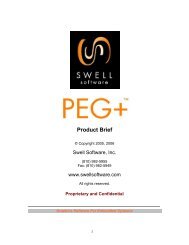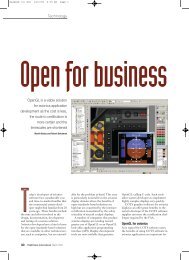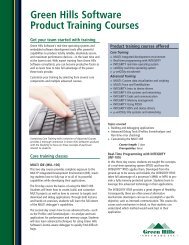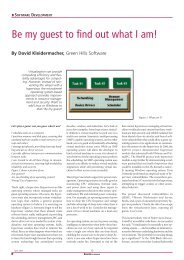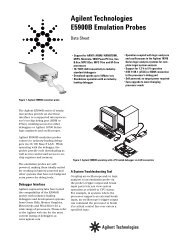Mixing Ada & C/C++ - Green Hills Software
Mixing Ada & C/C++ - Green Hills Software
Mixing Ada & C/C++ - Green Hills Software
- TAGS
- mixing
- green
- hills
- software
- www.ghs.com
You also want an ePaper? Increase the reach of your titles
YUMPU automatically turns print PDFs into web optimized ePapers that Google loves.
*UHHQ +LOOV 6RIWZDUH ,QF<br />
0L[LQJ $GD & &<br />
Technical Report<br />
Rev. 0.2 -- 11 June 1999
���������������<br />
The <strong>Green</strong> <strong>Hills</strong> <strong>Ada</strong>Multi Integrated Development Environment develops applications written in <strong>Ada</strong>,<br />
<strong>C++</strong>, C and FORTRAN. This report describes how a customer can use <strong>Ada</strong>Multi to develop a single<br />
application written in multiple languages. In particular, this report will discuss mixing <strong>Ada</strong> with C and<br />
<strong>C++</strong>. A basic understanding of <strong>Ada</strong> and C/<strong>C++</strong> is necessary for comprehending this report.<br />
Some reasons to mix <strong>Ada</strong> with C/<strong>C++</strong> are as follows:<br />
• A customer has a large body of legacy code written in <strong>Ada</strong> and they want to do future development<br />
in C/<strong>C++</strong>.<br />
• A customer prefers to develop applications in <strong>Ada</strong>, but is required to use a preexisting C/<strong>C++</strong><br />
library.<br />
With some limitations, both cases are possible.<br />
In general, an application is composed of one or more globally visible items. These items have a name<br />
that is associated with either the address of a data item or the address of a function entry point. The<br />
source code that generates these items is stored in one or more source files on the host development<br />
computer.<br />
Each source file is written in either <strong>Ada</strong> or C/<strong>C++</strong> and is processed by its own language compiler. The<br />
compilation process converts the source code to object code. The linker then combines these object<br />
code modules into a single executable image. Both <strong>Ada</strong> and C/<strong>C++</strong> use this “separate compile and<br />
link” approach. As long as all source files are written in the same language, the compile and link<br />
process proceeds smoothly. Problems arise when some files are written in <strong>Ada</strong> and others are written<br />
in C or <strong>C++</strong>.<br />
Let’s assume that a program is composed of two parts. One part is written in <strong>Ada</strong> and the other in<br />
C/<strong>C++</strong>. We might ask:<br />
1. How does one part refer to the other part’s globally visible data?<br />
2. How does one part dynamically create and subsequently refer to data items in the other part? How<br />
are those data items destroyed?<br />
3. How can one part call the other part’s functions? How are arguments passed? How is the return<br />
value passed back?<br />
4. Where is the program entry point? Is it “main()” in the C/<strong>C++</strong> part or is it a procedure in the <strong>Ada</strong><br />
part?<br />
This report will investigate these questions in the following sections.<br />
For the remainder of this report, the word “item” refers to an intrinsic data item, a composite data item,<br />
or a function. Further, the term “function” refers to both functions and procedures.
���������������������<br />
A statically allocated data item occupies a fixed location in memory that can be determined at link time.<br />
A source file can define static data items that are visible to other source files or it can access static data<br />
items that are defined in other source files.<br />
In C/<strong>C++</strong>, statically allocated data items are globally visible if they are defined outside of a function and<br />
the static qualifier is not present. A C/<strong>C++</strong> function can refer to a data item that has been statically<br />
allocated in another source file by declaring that data item with the extern keyword. For example, the<br />
following <strong>C++</strong> declarations create a data item visible to <strong>Ada</strong> and refer to a data item <strong>Ada</strong> has created.<br />
extern struct adastuff From<strong>Ada</strong>2Cpp; // Import from <strong>Ada</strong> to <strong>C++</strong><br />
struct cppstuff FromCpp2<strong>Ada</strong>; // Export from <strong>C++</strong> to <strong>Ada</strong><br />
A similar code fragment accomplishes the same thing in C:<br />
extern struct adastuff From<strong>Ada</strong>2C; // Import from <strong>Ada</strong> to C<br />
struct cstuff FromC2<strong>Ada</strong>; // Export from C to <strong>Ada</strong><br />
<strong>Ada</strong> programs make statically allocated data items globally visible to C/<strong>C++</strong> by using pragma export<br />
statements. An <strong>Ada</strong> procedure or function can refer to a data item that has been statically allocated in a<br />
C/<strong>C++</strong> source file by using a pragma import statement. Examples are:<br />
pragma import(CPP, CPP_HIS_STUFF, “FromCpp2<strong>Ada</strong>”);<br />
pragma export(CPP, CPP_MY_STUFF, “From<strong>Ada</strong>2Cpp”);<br />
pragma import(C, C_HIS_STUFF, “FromC2<strong>Ada</strong>”);<br />
pragma export(C, C_MY_STUFF, “From<strong>Ada</strong>2C”);<br />
These <strong>Ada</strong> statements associate a local <strong>Ada</strong> name with a global C/<strong>C++</strong> name. Note that an <strong>Ada</strong> name<br />
can contain embedded dots. This feature of the <strong>Ada</strong> language is incompatible with C/<strong>C++</strong>, since<br />
C/<strong>C++</strong> uses the dot character to indicate structure, union and class membership. These <strong>Ada</strong> pragmas<br />
perform the important functions of associating an internal <strong>Ada</strong> name with an external symbol and<br />
translating the external symbol into a form that is compatible with C/<strong>C++</strong>.<br />
<strong>Ada</strong> and C/<strong>C++</strong> can share any data type if the machine representations are binary compatible. The<br />
<strong>Ada</strong> package INTERFACES.C is useful for enforcing this correspondence. The following table shows<br />
this correspondence between <strong>Ada</strong> and <strong>C++</strong> types.<br />
������� ���������<br />
Integer int<br />
Interfaces.C.int int<br />
Short_Integer short<br />
Interfaces.C.short short<br />
Long_Integer long<br />
Long_Long_Integer long<br />
Interfaces.C.long long<br />
Character char<br />
Interfaces.C.char char<br />
Interfaces.C.plain_char char<br />
Interfaces.C.unsigned_char unsigned char<br />
Interfaces.C.signed_char signed char<br />
Byte_Integer signed char<br />
Short_Short_Integer signed char<br />
�
Interfaces.C.unsigned unsigned int<br />
Interfaces.C.unsigned_short unsigned short<br />
Interfaces.C.unsigned_long unsigned long<br />
Float float<br />
Interfaces.C.C_float float<br />
Long_Float double<br />
Interfaces.C.double double<br />
Interfaces.C.long_double double<br />
Interfaces.C.char_array char *<br />
Interfaces.C.wchar_t wchar_t<br />
<strong>Ada</strong> access types map to corresponding <strong>C++</strong> pointer types.<br />
<strong>Ada</strong>, C and <strong>C++</strong> can share structures, unions and arrays as well. Note that all <strong>Green</strong> <strong>Hills</strong> <strong>Ada</strong>, C and<br />
<strong>C++</strong> compilers allocate members of records and structures in the order that the members are declared.<br />
They also impose the same alignment requirements on the members. These two facts taken together<br />
ensure that if structures have the same number and type of members, they will be binary compatible.<br />
An example code fragment of <strong>Ada</strong> accessing a <strong>C++</strong> data structure is as follows:<br />
<strong>C++</strong> SIDE<br />
class cpprec // Define the structure<br />
{<br />
int numitems;<br />
float weightofitems;<br />
};<br />
cpprec cpp_name; // Declare the shared structure<br />
ADA SIDE<br />
type adarec is -- Define the structure<br />
record<br />
itemcount : INTEGER;<br />
itemweight : FLOAT;<br />
end record;<br />
ada_name : adarec; -- Declare the shared structure<br />
pragma import(cpp, ada_name, “cpp_name”);-- Tie the two names together<br />
Now, any reference by the <strong>Ada</strong> code to “ada_name.itemcount” will access the same integer memory<br />
location seen by <strong>C++</strong> as “cpp_name.numitems”.<br />
If the <strong>Ada</strong> record is tagged, then the <strong>C++</strong> definition of the record needs to allow space for the <strong>Ada</strong><br />
record tag. A dummy variable of type void* should be inserted in the class definition before the first<br />
data member. The following code fragment shows this:<br />
�
C/<strong>C++</strong> SIDE<br />
class cpprec // Define the structure<br />
{<br />
void* tagspace; // Allow space for the <strong>Ada</strong> tag<br />
int numitems;<br />
float weightofitems;<br />
};<br />
cpprec cpp_name; // Declare the shared structure<br />
ADA SIDE<br />
type adarec is tagged -- Define the structure<br />
record<br />
itemcount : INTEGER;<br />
itemweight : FLOAT;<br />
end record;<br />
ada_name : adarec; -- Declare the shared structure<br />
pragma import(cpp, ada_name, “cpp_name”);-- Tie the two names together<br />
Note that the <strong>Ada</strong> definition of records shared with <strong>C++</strong> does not have to allow for the vptr.<br />
C/<strong>C++</strong> code cannot directly access global data items from an existing <strong>Ada</strong> package since <strong>Ada</strong> global<br />
symbols have embedded dot characters. In this case, the programmer must use an <strong>Ada</strong> pragma<br />
export statement for every data item that needs to be visible from C/<strong>C++</strong>.<br />
�
�� ������������������������<br />
There are two closely related programming concepts: function and procedure. A procedure is simply a<br />
function that does not return a value. In <strong>Ada</strong>, a subprogram is either a procedure or a function. C/<strong>C++</strong>,<br />
on the other hand, only supports the concept of a function. However, a C/<strong>C++</strong> function can be<br />
declared as returning void; in which case, this is effectively the same as an <strong>Ada</strong> procedure. The void<br />
declaration simply tells the compiler not to expect a return value.<br />
There are many different kinds of functions in both <strong>Ada</strong> and C/<strong>C++</strong>. The following common function<br />
types can be used from either side.<br />
1. Globally visible functions – <strong>Ada</strong> can call C/<strong>C++</strong> global functions and C/<strong>C++</strong> can call <strong>Ada</strong> global<br />
functions.<br />
2. Member functions – <strong>Ada</strong> can call <strong>C++</strong> member functions. <strong>C++</strong> cannot call <strong>Ada</strong> dispatching<br />
operations.<br />
The <strong>Ada</strong> subprograms that cannot be accessed from C/<strong>C++</strong> are the dispatching operations and the<br />
INITIALIZE, FINALIZE and ADJUST functions of controlled types. All C/<strong>C++</strong> functions are accessible<br />
from <strong>Ada</strong>, although <strong>C++</strong> constructors and destructors should not be accessed directly from <strong>Ada</strong>.<br />
As with global data, the <strong>Ada</strong> pragma export and pragma import statements associate the <strong>Ada</strong><br />
function name with a C/<strong>C++</strong> function name.<br />
An example code fragment of an <strong>Ada</strong> call to a <strong>C++</strong> function follows:<br />
ADA SIDE<br />
function CPROC(input : in integer) return integer;<br />
pragma import(CPP, CPROC, “c_proc”);<br />
result : integer;<br />
...<br />
result := CPROC(123); -- Put answer in variable “result”<br />
C/<strong>C++</strong> SIDE<br />
int c_proc(int input)<br />
{<br />
int tmp; // Accumulate the result here.<br />
}<br />
... // Do some processing here.<br />
return tmp; // Return the result.<br />
For the case of functions, the <strong>Ada</strong> compiler uses <strong>C++</strong> name encoding to generate the actual global<br />
symbol. The programmer should ensure that the types of the arguments match between the<br />
declaration of the <strong>Ada</strong> function and the <strong>C++</strong> function. For record and enumeration argument types, the<br />
case-sensitive base name of the types must match between the <strong>Ada</strong> definition and the <strong>C++</strong> definition.<br />
The actual specification of the argument type does not matter. The table in section 2 shows the<br />
�
association of the argument types between <strong>Ada</strong> and C/<strong>C++</strong>. If the argument types do not match<br />
between the <strong>C++</strong> and <strong>Ada</strong> declarations of a function, there will be an undefined symbol at link time.<br />
In the above example, the actual external symbol generated for “c_proc” is “c_proc__Fi”. Note that the<br />
pragma import statement gets the argument types from the definition of the <strong>Ada</strong> function but gets the<br />
name of the function from the third argument of the pragma. Also, note that this third argument is a<br />
string. This allows the programmer to specify legal <strong>C++</strong> function identifiers that can’t be expressed in<br />
<strong>Ada</strong>; e.g., “MyClass::DoStuff”.<br />
For the case of non-static <strong>C++</strong> member functions, the <strong>Ada</strong> program must explicitly pass the “this<br />
pointer” to the <strong>C++</strong> function. The <strong>Ada</strong> function or procedure declaration referenced in the pragma<br />
import statement must explicitly specify “this” as the name of its first argument.<br />
C/<strong>C++</strong> code cannot directly call global functions from an existing <strong>Ada</strong> package since virtually all <strong>Ada</strong><br />
global symbols have embedded dot characters. In this case, the programmer must use a pragma<br />
export statement for every <strong>Ada</strong> function that needs to be visible to C/<strong>C++</strong>. For example:<br />
procedure MyProc(MyArg : integer);<br />
pragma import (C, MyProc, “c_funct”);<br />
Note that the second and third arguments in the pragma import statement are not required to be the<br />
same. In practice, they often are.<br />
For a description of <strong>C++</strong> name encoding, refer to section 7.2c of: Ellis & Stroustrup, The Annotated<br />
<strong>C++</strong> Reference Manual, 1990, Addison-Wesley Publishing Co., ISBN 0-201-51459-1.<br />
�
�� ����������������<br />
Program Initialization<br />
The main program can be written in <strong>Ada</strong> or C/<strong>C++</strong>. <strong>Green</strong> <strong>Hills</strong> supports either choice, so the<br />
programmer can pick whatever language is most applicable for the application at hand. In the case of<br />
both <strong>Ada</strong> and C/<strong>C++</strong>, the runtime system initialization code needs to be executed before the body of<br />
the main program starts. This initialization code is handled automatically and transparently when the<br />
program is written in a single language. With a mixed language system, the user’s initialization code<br />
must explicitly call the run-time system initialization code before items in the other language are<br />
accessed.<br />
If the main function is written in <strong>Ada</strong> and the <strong>Ada</strong> code references <strong>C++</strong> items, then the <strong>Ada</strong> main<br />
program should call the function “_main()” before any reference to a C/<strong>C++</strong> item.<br />
If the main function is written in C/<strong>C++</strong>, then “main()” must call a function named “adainit” before the first<br />
reference to any <strong>Ada</strong> items. It must also call “adafinal” after the last reference to all <strong>Ada</strong> items.<br />
For VxWorks, there can be multiple main programs running at one time. If the VxWorks main<br />
programs are written in <strong>C++</strong>, then the programmer should write a dummy <strong>Ada</strong> main program (e.g.,<br />
named “adadummymain”). “adadummymain” should use with statements to include any package that<br />
the <strong>C++</strong> code may need to call. The first <strong>C++</strong> main program to run should then call<br />
“adadummymain_adainit”. Further, one of the <strong>C++</strong> main programs should call<br />
“adadummymain_adafinal” after the last call to the <strong>Ada</strong> code.<br />
If all VxWorks main programs have been written in <strong>Ada</strong> and they reference a <strong>C++</strong> library, then one of<br />
the <strong>Ada</strong> main programs should call “_main” before <strong>C++</strong> as described above.<br />
Exception Handling<br />
Both <strong>Ada</strong> and <strong>C++</strong> support their own version of exception handling. As a program runs, the run-time<br />
system maintains a “call stack”. For example, function “main” calls function sub1(). Function sub1()<br />
calls function sub2() and function sub2() calls function sub3(). If function sub3() detects an exceptional<br />
condition, it may choose to “raise” (or “throw”) an exception. This exception transfers control to sub1()<br />
for exception handling.<br />
If all four functions are written in the same language, then the native exception handling mechanism will<br />
work as expected. Will this work if all the above functions are written in one language except sub2,<br />
which is written in the other language? If in the above example, sub2() was written in <strong>C++</strong> and it was<br />
compiled with the “–Xnewexchandling” switch, then the answer is yes. Exception handling is a<br />
(possibly) non-local transfer of control up the call stack. To accomplish this, the compiler builds tables<br />
that are used by the run-time exception handling mechanism. The “–Xnewexchandling” switch causes<br />
the <strong>C++</strong> compiler to build <strong>Ada</strong>-compatible exception handling tables.<br />
If, in the above example, all functions were written in <strong>C++</strong> and sub2() was written in <strong>Ada</strong>, then the<br />
answer is no. There is currently no mechanism in the <strong>Green</strong> <strong>Hills</strong> <strong>Ada</strong> compiler to build <strong>C++</strong> exception<br />
handling tables.<br />
�
�� ������������������<br />
Many of the more complicated interface chores can be implemented by writing functions that act as an<br />
interface between C/<strong>C++</strong> and <strong>Ada</strong>. A good approach is to establish a canonical set of interface<br />
functions for each <strong>C++</strong> class. This set should include, as a minimum, a function to create an instance<br />
of the class, copy an instance of the class, and delete an instance of the class. All other member<br />
functions can be accessed directly.<br />
For example, you might define a <strong>C++</strong> class named MyClass which has a member function named<br />
“Print”. The function “MyClass_<strong>Ada</strong>Create” creates an instance of an object of type MyClass and<br />
returns a pointer to it.<br />
ADA SIDE<br />
-- Define and import the three canonical interface functions<br />
-function<br />
MyClass_<strong>Ada</strong>Create return MyClass_<strong>Ada</strong>PtrType;<br />
function MyClass_<strong>Ada</strong>Copy(arg : in MyClass_<strong>Ada</strong>PtrType)<br />
return MyClass_<strong>Ada</strong>PtrType;<br />
procedure MyClass_<strong>Ada</strong>Delete(arg : in MyClass_<strong>Ada</strong>PtrType);<br />
pragma import (CPP, MyClass_<strong>Ada</strong>Create, “MyClass_<strong>Ada</strong>Create”);<br />
pragma import (CPP, MyClass_<strong>Ada</strong>Copy, “MyClass_<strong>Ada</strong>Copy”);<br />
pragma import (CPP, MyClass_<strong>Ada</strong>Delete, “MyClass_<strong>Ada</strong>Delete”);<br />
-- Define the normal member function “Print”. Note that the<br />
-- name of the first argument MUST be “this”.<br />
-procedure<br />
MyClass_Print(this : in MyClass_<strong>Ada</strong>PtrType);<br />
pragma import (CPP, MyClass_Print, “MyClass::Print”);<br />
-- Define the variables<br />
--<br />
Instance1 : MyClass_<strong>Ada</strong>PtrType; -- Pointer to 1 st object<br />
Instance2 : MyClass_<strong>Ada</strong>PtrType; -- Pointer to 2 nd object<br />
...<br />
-- Executable code.<br />
--<br />
Instance1 := MyClass_<strong>Ada</strong>Create; -- Create the object<br />
Instance2 := MyClass_<strong>Ada</strong>Copy(Instance1); -- Make a copy<br />
MyClass_Print(Instance1); -- Print Instance1<br />
MyClass_Print(Instance2); -- Print Instance2<br />
MyClass_<strong>Ada</strong>Delete(Instance1); -- Delete Instance1<br />
MyClass_<strong>Ada</strong>Delete(Instance2); -- Delete Instance2<br />
�
<strong>C++</strong> SIDE<br />
// Define the three canonical functions to create, copy,<br />
// and delete objects of type MyClass.<br />
//<br />
MyClass* MyClass_<strong>Ada</strong>Create(void)<br />
{<br />
return new MyClass; // Create a new one on the heap<br />
}<br />
MyClass* MyClass_<strong>Ada</strong>Copy(MyClass* src)<br />
{<br />
return new (*src); // Create a copy on the heap<br />
}<br />
void MyClass_<strong>Ada</strong>Delete(MyClass* deletethis)<br />
{<br />
delete *deletethis; // Delete this object<br />
}<br />
Note the pragma import statements in the above code fragments. The first parameter to the pragma<br />
specifies the external language. The second parameter to the pragma is the <strong>Ada</strong> name of the external<br />
function. The third parameter to the pragma is a string that specifies the fully qualified <strong>C++</strong> name of the<br />
function. External symbol names in <strong>C++</strong> are generated by a process called name mangling (or<br />
encoding). The <strong>Ada</strong> compiler knows how to generate this mangled symbol by using information from<br />
the preceding procedure declaration.<br />
�
�� �������������<br />
Do not call <strong>Ada</strong> dispatching operations from C/<strong>C++</strong>.<br />
Do not call <strong>C++</strong> constructors or destructors directly from <strong>Ada</strong>. Create <strong>C++</strong> interface functions to invoke<br />
new and delete for the object. See the example in the section on interface functions.<br />
Don’t attempt to call <strong>C++</strong> virtual member functions via the <strong>C++</strong> vptr/vtbl mechanism. <strong>Ada</strong> can directly<br />
call any <strong>C++</strong> member function if the <strong>Ada</strong> program has enough knowledge to determine exactly which<br />
function to call. For example, a <strong>C++</strong> base class B is defined with a member function “print”. Two<br />
classes D0 and D1 are derived from B and each has a member function “print” as well. In this<br />
example, there are three member functions B::print, D0::print and D1::print. If the <strong>Ada</strong> program has a<br />
pointer to an object of type D0, it can call D0::print. If the <strong>Ada</strong> program has a pointer to an object of<br />
type D1, it can call D1::print. If the <strong>Ada</strong> program has a pointer to an object of type B, it doesn’t know<br />
whether to call B::print, D0::print or D1::print.<br />
��
�� �������<br />
The following example implements a small symbol table class. A symbol table is a mechanism that<br />
stores items that contain name/value pairs. For each item, the name is a string of characters and the<br />
value is an integer. The name of the class is “symtbl” and it has a member function called “add”. The<br />
arguments to symtbl::add are the name string and the value. If the name string passed to symtbl::add<br />
is already in the table, the operation is discarded.<br />
This example contains six files that fall into three categories:<br />
File Name Category Description<br />
symtbl.h Class Library <strong>C++</strong> interface specification for class symtbl.<br />
symtbl.cpp Class Library <strong>C++</strong> implementation for class symtbl.<br />
symtbl_ads.cpp <strong>Ada</strong> Interface <strong>C++</strong> interface routines for <strong>Ada</strong> to access class symtbl.<br />
symtbl.ads <strong>Ada</strong> Interface <strong>Ada</strong> specification for class symtbl<br />
adamain.ada Main Program <strong>Ada</strong> main program.<br />
cppmain.cpp Main Program <strong>C++</strong> main program.<br />
An <strong>Ada</strong> program can be build from the files symtbl.h, symtbl.cpp, symtbl_ads.cpp, symtbl.ads and<br />
adamain.ada. The <strong>C++</strong> program can be build from files symtbl.h, symtbl.cpp and cppmain.cpp.<br />
The <strong>C++</strong> program creates a symbol table and stores some words in it. It then prints out a list of the<br />
stored words. Note that the duplicates are not printed. The <strong>Ada</strong> program does exactly the same thing<br />
as the <strong>C++</strong> program.<br />
��
// File: symtbl.h -- Interface for symbol table class<br />
//<br />
class symtbl; ////////// Symbol table class<br />
class ste; ////////// Symbol table entry<br />
class symtbl // Symbol Table<br />
{<br />
public: // Everything is public for this example<br />
};<br />
int howmany; // Number of elements in the list<br />
ste* elements; // List head pointer<br />
ste* current; // The "current" table element<br />
symtbl(); // Default constructor<br />
symtbl(const symtbl&); // Copy constructor<br />
~symtbl(); // Destructor<br />
ste* add(char* name, int value); // Add an element to a table<br />
ste* first(void); // Find the first element of a table<br />
ste* next(void); // Find the successor element<br />
ste* print(void); // Print the current element of a table<br />
class ste // Symbol Table Entry<br />
{<br />
public: // Everything is public for this example<br />
};<br />
ste* link; // Elements are linked in a list<br />
char* namestring; // Pointer to the name string<br />
int value; // Associated value<br />
ste(); // Default constructor<br />
ste(const ste&); // Copy constructor<br />
ste(char* name, int value); // Normal constructor<br />
~ste(); // Destructor<br />
��
// File: symtbl.cpp -- Body for symbol table class<br />
//<br />
#include <br />
#include <br />
#include <br />
#include "symtbl.h"<br />
// class ste member functions.<br />
//<br />
ste::ste() // Default constructor<br />
{<br />
link = NULL; // Init the link<br />
namestring = new char[10]; // Allocate memory<br />
if(namestring) // Default string<br />
strcpy(namestring, "$DEFAULT$");<br />
value = 0; // Default value<br />
}<br />
ste::ste(const ste& src) // Copy constructor<br />
{<br />
link = NULL; // Init the link<br />
namestring = // Allocate memory<br />
new char[strlen(src.namestring)+1];<br />
if(namestring) // Copy the string<br />
strcpy(namestring, src.namestring);<br />
value = src.value; // Default value<br />
}<br />
ste::ste(char* nam, int val) // Normal constructor<br />
{<br />
link = NULL; // Init the link<br />
namestring = new char[strlen(nam)+1]; // Allocate memory<br />
if(namestring) strcpy(namestring, nam); // Copy the string<br />
value = val; // Save the value<br />
}<br />
ste::~ste() // Destructor<br />
{<br />
delete namestring; // Delete the string’s memory<br />
}<br />
// class symtbl member functions<br />
//<br />
symtbl::symtbl() // Default constructor<br />
{<br />
howmany = 0; // No elements in the table<br />
elements = NULL; // Element list is empty<br />
current = NULL; // No current element<br />
}<br />
symtbl::symtbl(const symtbl& src) // Copy Constructor<br />
{<br />
��
}<br />
ste* p = src.elements; // Get listhead from src<br />
while(p) // While something to do...<br />
{<br />
add(p->namestring, p->value); // Add this new element<br />
p = p->link; // Point at the next one<br />
}<br />
symtbl::~symtbl() // Destroy the table<br />
{<br />
while(elements) // Something is in the list...<br />
{<br />
ste* p = elements->link; // Get a pointer to next one<br />
delete elements; // Delete this element<br />
elements = p;<br />
}<br />
}<br />
ste* symtbl::add(char *nam, int val)<br />
{<br />
ste* p = elements; // Get a pointer to the list<br />
ste* q = NULL; // Get a place to save the end<br />
}<br />
while(p) // Go look for it<br />
{<br />
if(strcmp(p->namestring, nam) == 0) // Already here<br />
return NULL;<br />
q = p; // Remember this pointer<br />
p = p->link; // Link to the next one<br />
}<br />
p = new ste(nam, val); // Make a new one<br />
if(q) // Something already on list<br />
q->link = p; // Put this new one on too<br />
else // Nothing is on the list<br />
elements = p; // Make this new one first<br />
howmany += 1; // Show one more in the list<br />
return current = p; // Make this new one current<br />
ste* symtbl::first(void)<br />
{<br />
return current = elements; // Make list head current<br />
}<br />
ste* symtbl::next(void)<br />
{<br />
if(current) current = current->link; // Return next element pointer<br />
return current;<br />
��
}<br />
ste* symtbl::print(void)<br />
{<br />
if(current) // Only if current exists<br />
{<br />
cout
// File: symtbl_ads.cpp -- Symtbl interface routines<br />
//<br />
#include "symtbl.h"<br />
// This file contains the create/copy/delete interface routines. Since<br />
// they need to be able to access the <strong>C++</strong> storage allocation mechanism,<br />
// they are written in <strong>C++</strong>.<br />
//<br />
symtbl* symtbl_create(void)<br />
{<br />
return new symtbl;<br />
}<br />
symtbl* symtbl_copy(symtbl* src)<br />
{<br />
return new symtbl(*src);<br />
}<br />
void symtbl_destroy(symtbl* src)<br />
{<br />
delete src;<br />
}<br />
��
--------------------------------------------------------------------------------<br />
-- File: symtbl.ads -- <strong>Ada</strong> interface spec. for <strong>C++</strong> symtbl package.<br />
--<br />
WITH Interfaces.C;<br />
PACKAGE symtbl IS<br />
-- Declare some useful types.<br />
--<br />
TYPE ste IS RECORD NULL; END RECORD; -- Dummy entry record<br />
TYPE ste_ptr IS ACCESS ste; -- Entry record pointer<br />
TYPE symtbl IS -- Table record<br />
RECORD<br />
howmany : INTEGER; -- How many in this table<br />
elements : ste_ptr; -- List head<br />
current : ste_ptr; -- Current element<br />
END RECORD;<br />
TYPE symtbl_ptr IS ACCESS symtbl; -- Table record pointer<br />
TYPE char_ptr IS NEW Interfaces.C.char_array; -- Pointer to C string<br />
-- Declare the create, copy and destroy interface functions. Note<br />
-- that in the following three PRAGMA IMPORTs, the second and third<br />
-- arguments are the same. This is just a convention and not a<br />
-- requirement.<br />
--<br />
FUNCTION symtbl_create RETURN symtbl_ptr;<br />
FUNCTION symtbl_copy(src : IN symtbl_ptr) RETURN symtbl_ptr;<br />
PROCEDURE symtbl_destroy(src : IN symtbl_ptr);<br />
PRAGMA IMPORT(CPP, symtbl_create, "symtbl_create");<br />
PRAGMA IMPORT(CPP, symtbl_copy, "symtbl_copy");<br />
PRAGMA IMPORT(CPP, symtbl_destroy, "symtbl_destroy");<br />
-- Declare the <strong>C++</strong> member functions. These functions are accessed directly;<br />
-- i.e., there is no intermediate interface routine.<br />
--<br />
FUNCTION symtbl_add (this : IN symtbl_ptr;<br />
name : IN char_ptr;<br />
value : IN Interfaces.C.int) RETURN ste_ptr;<br />
FUNCTION symtbl_first(this : IN symtbl_ptr) RETURN ste_ptr;<br />
FUNCTION symtbl_next (this : IN symtbl_ptr) RETURN ste_ptr;<br />
FUNCTION symtbl_print(this : IN symtbl_ptr) RETURN ste_ptr;<br />
PRAGMA IMPORT(CPP, symtbl_add, "symtbl::add");<br />
PRAGMA IMPORT(CPP, symtbl_first, "symtbl::first");<br />
PRAGMA IMPORT(CPP, symtbl_next, "symtbl::next");<br />
PRAGMA IMPORT(CPP, symtbl_print, "symtbl::print");<br />
END symtbl;<br />
��
--------------------------------------------------------------------------------<br />
-- File: adamain.ada -- <strong>Ada</strong> main test program for <strong>C++</strong> symtbl package<br />
--<br />
WITH text_io;<br />
WITH symtbl; USE symtbl;<br />
with interfaces.c; use interfaces.c;<br />
PROCEDURE symtbl_main IS<br />
BEGIN<br />
PROCEDURE cpp_Initialization;<br />
PRAGMA IMPORT(C, cpp_Initialization, "_main");<br />
pt_my_table : symtbl_ptr; -- Ptr to a table<br />
tmp : ste_ptr; -- Ptr to a table entry<br />
cpp_Initialization;<br />
text_io.put_line("adamain -- <strong>Ada</strong> test driver for <strong>C++</strong> symtbl package");<br />
-- Create a table<br />
-pt_my_table<br />
:= symtbl_create;<br />
-- Add a bunch of entries<br />
-tmp<br />
:= symtbl_add(pt_my_table, TO_C("the"), 1);<br />
tmp := symtbl_add(pt_my_table, TO_C("boy"), 2);<br />
tmp := symtbl_add(pt_my_table, TO_C("stood"), 3);<br />
tmp := symtbl_add(pt_my_table, TO_C("on"), 4);<br />
tmp := symtbl_add(pt_my_table, TO_C("the"), 5);<br />
tmp := symtbl_add(pt_my_table, TO_C("burning"), 6);<br />
tmp := symtbl_add(pt_my_table, TO_C("deck,"), 7);<br />
tmp := symtbl_add(pt_my_table, TO_C("eating"), 8);<br />
tmp := symtbl_add(pt_my_table, TO_C("peanuts"), 9);<br />
tmp := symtbl_add(pt_my_table, TO_C("by"), 10);<br />
tmp := symtbl_add(pt_my_table, TO_C("the"), 11);<br />
tmp := symtbl_add(pt_my_table, TO_C("peck."), 12);<br />
-- Print out the table.<br />
-text_io.put("The<br />
number of items in this table is:");<br />
text_io.put(INTEGER’IMAGE(pt_my_table.howmany));<br />
text_io.new_line;<br />
tmp := symtbl_first(pt_my_table);<br />
WHILE(tmp /= NULL) LOOP<br />
tmp := symtbl_print(pt_my_table);<br />
tmp := symtbl_next (pt_my_table);<br />
END LOOP;<br />
-- Clean up.<br />
��
-symtbl_destroy(pt_my_table);<br />
-- Destroy my table<br />
END symtbl_main;<br />
The following is the console output for the <strong>Ada</strong> main program. Note that the duplicate values are not<br />
printed.<br />
$ adamain<br />
adamain -- <strong>Ada</strong> test driver for <strong>C++</strong> symtbl package<br />
The number of items in this table is: 10<br />
the<br />
boy<br />
stood<br />
on<br />
burning<br />
deck,<br />
eating<br />
peanuts<br />
by<br />
peck.<br />
$<br />
��
// File: cppmain.cpp -- Symbol table test driver<br />
//<br />
#include <br />
#include <br />
#include "symtbl.h"<br />
char* input[] =<br />
{<br />
"the","boy","stood","on","the","burning","deck,",<br />
"eating","peanuts","by","the","peck.", NULL<br />
};<br />
main()<br />
{<br />
symtbl mytbl;<br />
int i = 0;<br />
}<br />
for(char** p = input; *p; ) mytbl.add(*p++, i+=1);<br />
cout
��



